The Fenugreek Fiber Market is estimated to be valued at USD 178.0 million in 2025 and is projected to reach USD 253.5 million by 2035, registering a compound annual growth rate (CAGR) of 3.6% over the forecast period.
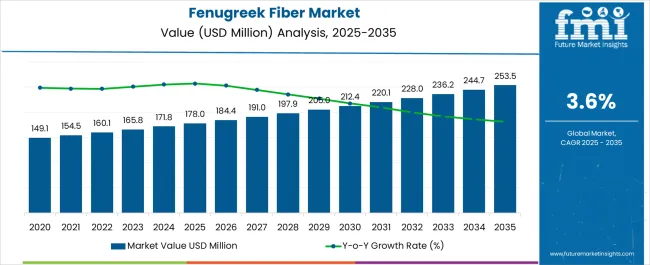
| Metric | Value |
|---|---|
| Fenugreek Fiber Market Estimated Value in (2025 E) | USD 178.0 million |
| Fenugreek Fiber Market Forecast Value in (2035 F) | USD 253.5 million |
| Forecast CAGR (2025 to 2035) | 3.6% |
The Fenugreek Fiber market is experiencing steady growth due to its increasing adoption in health-oriented food products, functional foods, and dietary supplements. Rising consumer awareness regarding gut health, digestive wellness, and high-fiber nutrition has been driving demand across both developed and emerging markets. The market is further supported by growing interest in natural and plant-based ingredients, which are being preferred over synthetic alternatives for their perceived health benefits and sustainability.
Manufacturers are focusing on enhancing product availability through diversified distribution channels, including both modern retail and online platforms, to reach a wider consumer base. Additionally, innovation in product formulations and ease of incorporation into multiple food and beverage applications has strengthened market adoption.
With consumers increasingly prioritizing health-conscious diets, Fenugreek Fiber is positioned as a functional ingredient with growing relevance The ongoing expansion of functional food markets, coupled with the trend toward preventive healthcare, is expected to propel market growth in the coming years.
The fenugreek fiber market is segmented by nature, end-use, distribution channel, and geographic regions. By nature, fenugreek fiber market is divided into Organic and Conventional. In terms of end-use, fenugreek fiber market is classified into Food And Beverage, Jelly And Candies, Soups And Spreads, Milkshakes, Ice Cream And Chocolate, Frozen Foods, Bakery Products, Nutraceuticals, Dietary Supplements, and Cosmetic And Personal Care. Based on distribution channel, fenugreek fiber market is segmented into Online Retailers, Wholesalers, Supermarkets, and Specialty Stores. Regionally, the fenugreek fiber industry is classified into North America, Latin America, Western Europe, Eastern Europe, Balkan & Baltic Countries, Russia & Belarus, Central Asia, East Asia, South Asia & Pacific, and the Middle East & Africa.
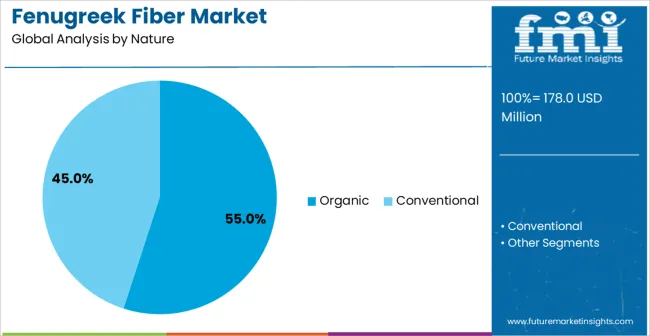
The Organic segment is projected to hold 55.00% of the Fenugreek Fiber market revenue share in 2025, making it the leading nature-based segment. This prominence is being attributed to the rising consumer preference for clean-label and naturally sourced ingredients.
Organic fenugreek fiber is increasingly preferred due to its minimal processing, higher nutrient retention, and absence of synthetic additives, aligning with the global demand for sustainable and health-oriented food ingredients. Growth has been further facilitated by expanding certification standards, greater consumer trust, and increasing adoption by food and beverage manufacturers who are integrating organic ingredients into functional products.
The segment benefits from the perception of superior safety and quality associated with organic farming practices, which has encouraged repeated purchases and long-term adoption As demand for natural and organic dietary supplements continues to rise, the Organic segment is anticipated to maintain its leading position, supported by consumer-driven trends favoring transparency, environmental responsibility, and functional health benefits.
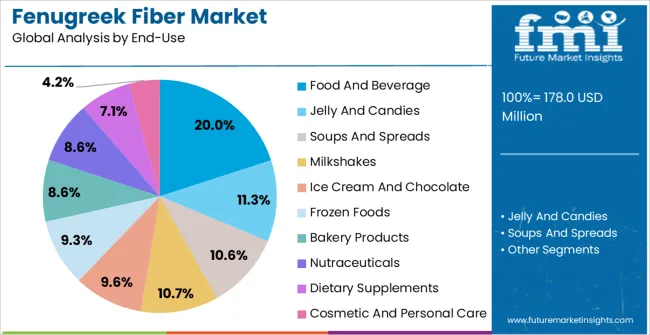
The Food and Beverage end-use industry is expected to account for 20.00% of the Fenugreek Fiber market revenue share in 2025, establishing it as the most significant application segment. The growth of this segment is being driven by the increasing incorporation of fenugreek fiber in functional foods, bakery products, snacks, and nutritional beverages.
Manufacturers are leveraging the fiber’s natural solubility, health benefits, and neutral taste to formulate products that cater to the rising demand for digestive health and weight management solutions. The segment has been further reinforced by evolving consumer preferences for fiber-enriched products that promote satiety, gut health, and overall wellness.
Product versatility and ease of integration into a variety of food matrices have accelerated adoption across the industry With increasing consumer awareness regarding dietary fiber benefits and proactive nutrition, the Food and Beverage segment is expected to maintain a strong market presence and continue driving the demand for fenugreek fiber-based formulations.
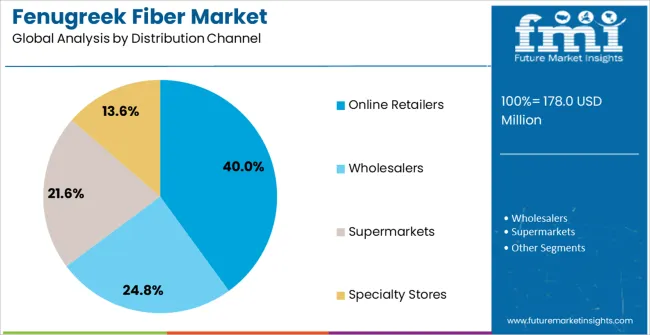
The Online Retailers distribution channel is anticipated to hold 40.00% of the Fenugreek Fiber market revenue share in 2025, making it the leading channel for product accessibility. This leadership is being driven by the rapid growth of e-commerce platforms and direct-to-consumer sales models, which provide convenience, broader product variety, and home delivery options.
Consumers are increasingly preferring online channels for purchasing dietary fibers and functional food ingredients due to easy price comparison, product reviews, and access to specialty organic products. The segment benefits from the expanding digital infrastructure, improved logistics networks, and the rise of health-conscious consumer behavior, which has encouraged repeated online purchases.
Additionally, manufacturers are leveraging online retail to introduce innovative formulations and target niche consumer segments The Online Retailers segment is expected to continue its dominance as digital adoption accelerates, providing a scalable platform for market expansion and enhanced consumer engagement.
Fenugreek, a plant belonging to the Fabaceae family, is widely used in food preparation in various regions such as Southwest Asia, central Europe, and Africa, owing to its unique flavor. The seeds of fenugreek contain a type of polymer called galactomannans, which is primarily responsible for the plant's fiber content. Galactomannans are produced only by a few select plants, mainly endospermic seeds from the Fabaceae family, including fenugreek seeds, guar, tara, and locust bean. To extract fenugreek fiber, powdered fenugreek seeds are utilized.
Fenugreek fiber is a soluble fiber with high viscosity due to a 1:1 ratio of galactose to mannose present in it. It possesses excellent hydration properties, causing an increase in viscosity when dissolved in water. Moreover, fenugreek fiber has remarkable stability, has a long shelf life, and can withstand baking, cooking, freezing, and frying. Fenugreek fiber is known for its ability to treat various health issues, including constipation, stomach discomfort, obesity, kidney problems, and heartburn. It is particularly beneficial for people with diabetes, as it lowers blood sugar levels and helps in diabetes management.
In our new study, ESOMAR-certified market research and consulting firm Future Market Insights (FMI) offers insights into key factors driving demand for Fenugreek Fiber.
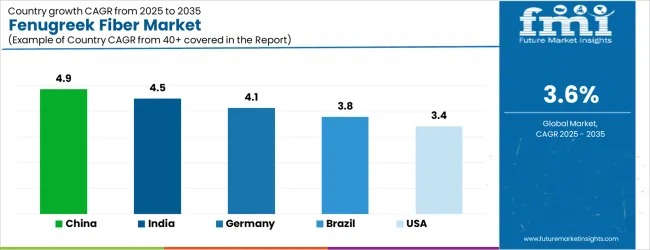
| Country | CAGR |
|---|---|
| China | 4.9% |
| India | 4.5% |
| Germany | 4.1% |
| Brazil | 3.8% |
| USA | 3.4% |
| U.K. | 3.1% |
| Japan | 2.7% |
The Fenugreek Fiber Market is expected to register a CAGR of 3.6% during the forecast period, exhibiting varied country level momentum. China leads with the highest CAGR of 4.9%, followed by India at 4.5%. Developed markets such as Germany, France, and the U.K. continue to expand steadily, while the U.S. is likely to grow at consistent rates. Japan posts the lowest CAGR at 2.7%, yet still underscores a broadly positive trajectory for the global Fenugreek Fiber Market. In 2024, Germany held a dominant revenue in the Western Europe market and is expected to grow with a CAGR of 4.1%. The U.S. Fenugreek Fiber Market is estimated to be valued at USD 65.6 million in 2025 and is anticipated to reach a valuation of USD 65.6 million by 2035. Sales are projected to rise at a CAGR of 0.0% over the forecast period between 2025 and 2035. While Japan and South Korea markets are estimated to be valued at USD 9.1 million and USD 6.2 million respectively in 2025.
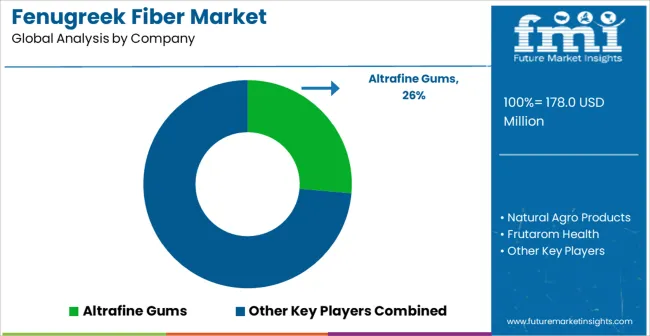
| Item | Value |
|---|---|
| Quantitative Units | USD 178.0 Million |
| Nature | Organic and Conventional |
| End-Use | Food And Beverage, Jelly And Candies, Soups And Spreads, Milkshakes, Ice Cream And Chocolate, Frozen Foods, Bakery Products, Nutraceuticals, Dietary Supplements, and Cosmetic And Personal Care |
| Distribution Channel | Online Retailers, Wholesalers, Supermarkets, and Specialty Stores |
| Regions Covered | North America, Europe, Asia-Pacific, Latin America, Middle East & Africa |
| Country Covered | United States, Canada, Germany, France, United Kingdom, China, Japan, India, Brazil, South Africa |
| Key Companies Profiled | Altrafine Gums, Natural Agro Products, Frutarom Health, Nature’s Own, GlucoBliss Pure, Fenu Fiber, GNC Herbal Plus, Nature’s Plus, and Wonder Laboratories |
The global fenugreek fiber market is estimated to be valued at USD 178.0 million in 2025.
The market size for the fenugreek fiber market is projected to reach USD 253.5 million by 2035.
The fenugreek fiber market is expected to grow at a 3.6% CAGR between 2025 and 2035.
The key product types in fenugreek fiber market are organic and conventional.
In terms of end-use, food and beverage segment to command 20.0% share in the fenugreek fiber market in 2025.






Full Research Suite comprises of:
Market outlook & trends analysis
Interviews & case studies
Strategic recommendations
Vendor profiles & capabilities analysis
5-year forecasts
8 regions and 60+ country-level data splits
Market segment data splits
12 months of continuous data updates
DELIVERED AS:
PDF EXCEL ONLINE
Market Positioning & Share in Fenugreek Seed Extract Manufacturing
Fiber Optic Tester Market Size and Share Forecast Outlook 2025 to 2035
Fiber Laser Market Size and Share Forecast Outlook 2025 to 2035
Fiberglass Market Size and Share Forecast Outlook 2025 to 2035
Fiber Spinning Equipment Market Size and Share Forecast Outlook 2025 to 2035
Fiber Reinforced Plastic (FRP) Panels & Sheets Market Size and Share Forecast Outlook 2025 to 2035
Fiberglass Fabric Market Size and Share Forecast Outlook 2025 to 2035
Fiber Optic Connectivity Market Size and Share Forecast Outlook 2025 to 2035
Fiber Optic Collimating Lens Market Size and Share Forecast Outlook 2025 to 2035
Fiberglass Duct Wrap Insulation Market Size and Share Forecast Outlook 2025 to 2035
Fiber-Based Blister Pack Market Analysis - Size and Share Forecast Outlook 2025 to 2035
Fiber Optics Testing Market Size and Share Forecast Outlook 2025 to 2035
Fiber Laser Coding System Market Size and Share Forecast Outlook 2025 to 2035
Fiber Optics Market Size and Share Forecast Outlook 2025 to 2035
Fiber Reinforced Polymer (FRP) Rebars Market Size and Share Forecast Outlook 2025 to 2035
Fiber Supplements Market Size and Share Forecast Outlook 2025 to 2035
Fiberglass Filters Market Size and Share Forecast Outlook 2025 to 2035
Fiber Optic Test Equipment Market Outlook - Size, Share & Forecast 2025 to 2035
Fiberglass Light Poles Market Size and Share Forecast Outlook 2025 to 2035
Fiberboard Packaging Market Size and Share Forecast Outlook 2025 to 2035

Thank you!
You will receive an email from our Business Development Manager. Please be sure to check your SPAM/JUNK folder too.
Chat With
MaRIA